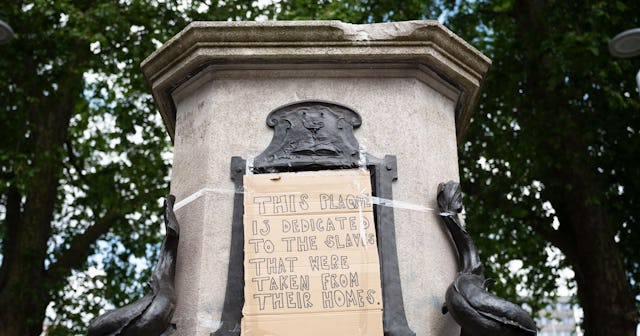When It Comes To Reparations, Black People Deserve More Than An Apology

Our American history is steeped in centuries upon centuries of injustices done to people by people in the name of protecting one group of people: white people. In 1865, when Black people were freed from slavery, land along the Atlantic coastline was intended to be redistributed to recently-freed Black men — opening the door for over 40,000 newly freed men in the South to build and plant crops. A bill passed by President Lincoln and Congress in what became known as “40 acres and a mule” — a promise that would help Black people rise from the shackles of slavery — was vetoed after Lincoln’s assassination by his predecessor President Andrew Johnson.
Over the last two years, the idea of reparations to be disbursed to the descendants of over four million enslaved Black people has been the topic of conversation, especially with the momentum of the Black Lives Matter movement. The idea of reparations would essentially compensate Black people for what their ancestors were never given: a long overdue paycheck, education, health care — all a recipe for building wealth. Because it was there, within the empty wallets of freedmen and women of the 1800s, that systemic racism was born.
If an entire group of people are murdered, lynched, beaten, kept out of jobs, discriminated against, and denied access to housing, health care, proper education, and jobs — how can they possibly get ahead? How can their children, or their children’s children, get ahead? How can generational wealth exist for them? They cannot get ahead, and generational wealth cannot exist, when history tells us we, as Black people, live on a land that was not meant for us; land that we built to make other people rich.
NurPhoto/Getty
If the descendants of slaves were to receive reparations for the trillions of hours worked by our ancestors, it would not erase the past. What it would do, in some ways, is level the playing field for millions of Black people whose median household income in 2017 was just over $40,000. Reparations could mean access to land that our ancestors worked, that would become ours without a 20% down payment or loan approval from a bank — something that is statistically harder for minorities to get.
How can we put a number on the hourly wages earned if our ancestors were never counted? How can we expect fairness today in 2020 when we are still fighting to be considered equal, fighting for justice, and demanding peace? The Black Lives Matter protests have ignited a fire within so many across our country, starting with Black people and spanning across all racial and socio-economic classes. The calls for justice stretches across oceans and into homes far from our own.
Would a formal acknowledgement and apology from the government suffice for reparations? Would the words “I am sorry” or “We were wrong” be enough to right the wrongs of our past? For me? No, it would not.
NurPhoto/Getty
I would like to see the playing field, as it were, leveled for Black people. Of course I would like to hear a formal apology from the United States government which would act as an acknowledgement that wrongs were done for hundreds of years to Black people in this very country. But in addition, I would love to see actions to back that up: starting with monuments and statues built which honor the legacy of the brave Black men and women who pushed barriers and broke down walls to fight for the freedom of their people. I want to see these statues on the streets and in parks in every part of the United States from South to North — not just housed in the National Museum of African American History and Culture.
I want to see the stories of our history told, truthfully, for every American to bear witness to when they step out of their homes. I’d like to see a national healthcare which would provide health insurance for the uninsured. I would like to see a commitment to giving the opportunity of homeownership to Black people through either an automatic grant when they choose to buy a home and/or a few acres of land which would be transferred to them.
Finally, I’d like to see an investment in education in communities that are struggling economically, often places in which people of color live. We know that obtaining an education lifts people out of poverty.
This is just a start to what providing reparations for the Black community can do: build economic, social, psychological, and educational wealth. Yes, a lump sum of money would help as many have suggested, but that cannot be the only investment. We deserve a better legacy to leave our children.
This article was originally published on